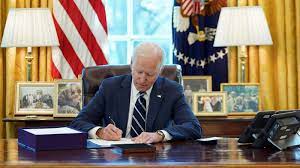I just came back from a 10-day holiday off (the longest vacation time I’ve had in years), and I promised myself not to check my emails, not to blog and not to check any work-related social media. It was tough initially, but I had a great time off exploring the Canadian Maritimes. One interesting trip that I took was a visit to the Alexander Graham Bell museum in Baddeck, Cape Breton Island. I didn’t realize that there was more to Graham Bell’s innovations besides the telegraph and telephone creation. He was also conducting experiments with energy recycling and alternative fuels, genetics and mutations, and even desalination. I’ve also learned several interesting tidbits about the forestry industry in the northeastern part of Canada.

Given my great timing, of course, I missed the announcement from US President Biden, who signed an executive order (EO) on September 12 to launch a National Biotechnology and Biomanufacturing Initiative where which will allow cabinet agencies will announce a wide range of new investments and resources that will allow the United States to harness the full potential of biotechnology and biomanufacturing aimed to grow America’s bioeconomy across multiple sectors, including the health, agriculture and energy industries. The White House said the initiative will drive advances in biomanufacturing that substitute fragile supply chains from abroad with strong chains at home, anchored by well-paying jobs in communities across the nation.
“The COVID-19 pandemic has demonstrated the vital role of biotechnology and biomanufacturing in developing and producing life-saving diagnostics, therapeutics, and vaccines that protect Americans and the world. Although the power of these technologies is most vivid at the moment in the context of human health, biotechnology and biomanufacturing can also be used to achieve our climate and energy goals, improve food security and sustainability, secure our supply chains, and grow the economy across all of America.”
The Initiative will focus on:
- Grow Domestic Biomanufacturing Capacity, including through investments in regional innovation and enhanced bio-education, while strengthening the U.S. supply chain that produces domestic fuels, chemicals, and materials.
- Expand Market Opportunities for Bio-based Products, including an increase in mandatory bio-based purchasing by Federal agencies via the BioPreferred program.
- Drive Research and Development (R&D) to Solve Our Greatest Challenges. This Initiative directs Federal agencies to identify priority R&D needs to translate bioscience and biotechnology discoveries into medical breakthroughs, climate change solutions, food and agricultural innovation, and stronger U.S. supply chains.
- Improve Access to Quality Federal Data which will ensure that biotechnology developers have streamlined access to high-quality, secure, and wide-ranging biological data sets that can drive solutions to urgent societal and global problems.
- Train a Diverse Skilled Workforce. The Initiative will expand training and education opportunities for all Americans in biotechnology and biomanufacturing, with a focus on advancing racial and gender equity and support for talent development in underserved communities.
- Streamline Regulations for Products of Biotechnology. The Initiative will improve the clarity and efficiency of the regulatory process for products of biotechnology so that valuable inventions and products can come to market faster without sacrificing safety.
- Advance Biosafety and Biosecurity to Reduce Risk. The Initiative will prioritize investments in applied biosafety research and incentivize innovations in biosecurity to reduce risk throughout the biotechnology research and development lifecycles.
- Protect the U.S. Biotechnology Ecosystem. The Initiative will protect the U.S. biotechnology ecosystem by advancing privacy standards and practices for human biological data, cybersecurity practices for biological data, standards development for bio-related software, and mitigation measures for risks posed by foreign adversary involvement in the biomanufacturing supply chain.
- Build a Thriving, Secure Global Bioeconomy with Partners and Allies. The Initiative advances international cooperation to leverage biotechnology and biomanufacturing to tackle the most urgent global challenges – from climate change to health security – and to work together to ensure that biotechnology product development and use aligns with our shared democratic ethics and values, and that biotechnology breakthroughs benefit all citizens.
As part of the recently passed CHIPS and Science Act, the US Congress is expected to provide more than $52 billion for manufacturing, scientific research, and workforce development, with a focus on semiconductors. This bipartisan piece of industrial policy will also expand research into domestic biomanufacturing, speed up the commercialization of new biotechnology products, train a diversified workforce of life science professionals, and address head-on the ethical, legal, environmental, safety, security, and other appropriate concerns related to new biotechnologies. The bill creates a mechanism to coordinate federal resources and also develop an ongoing bioeconomy strategy.
Here is a video from the White House on Biotechnology and Biomanufacturing Summit roundtable, which included speeches from various US government agencies, industry organizations and companies. The summit was led by Jake Sullivan, National Security Advisor, Brian Deese, Director of the National Economic Council, and Alondra Nelson, PhD, Director of the Office of Science and Technology.
Definitely exciting times for the US Renewable Chemicals, Materials and Energy Markets!





One response to “USA launches National Biotechnology and Biomanufacturing Initiative”
Great post summarizing this new initiative. Also comments about the Canadian Maritimes and especially the Alexander Graham Bell museum in Baddeck, Cape Breton Island are spot on.